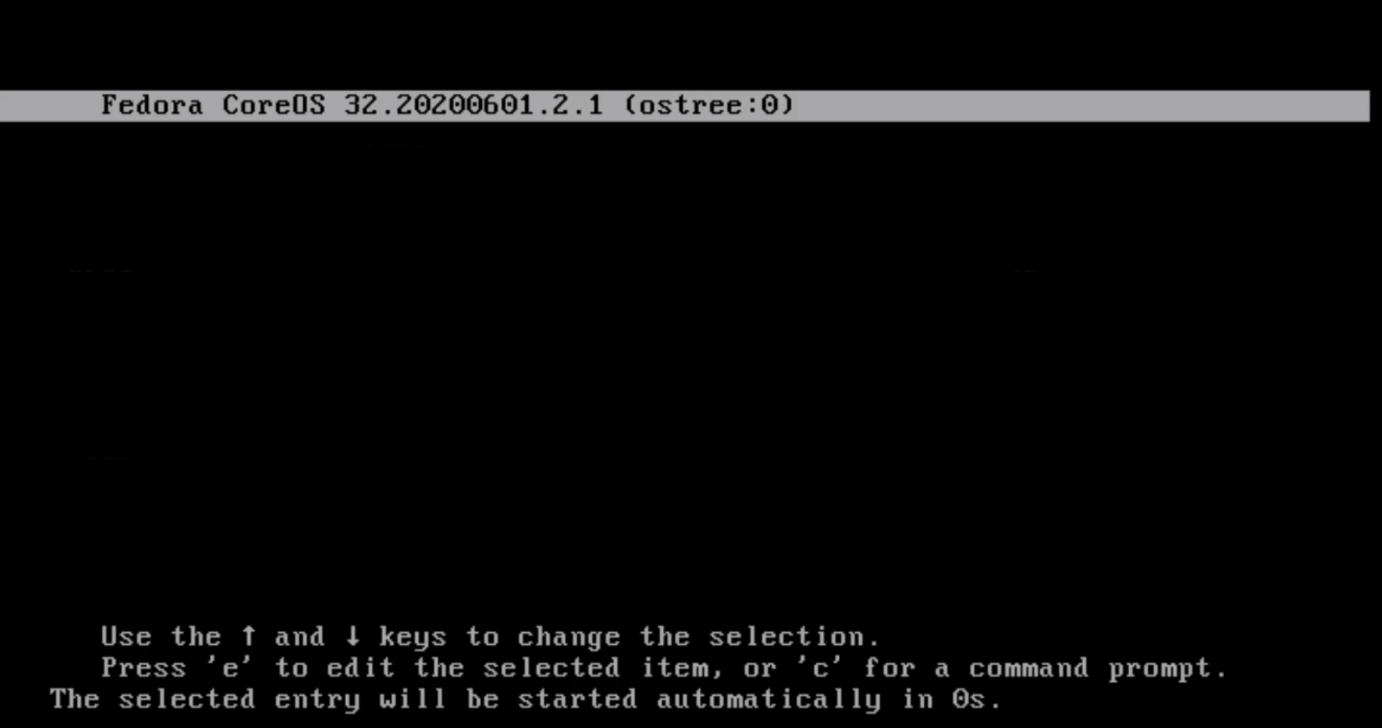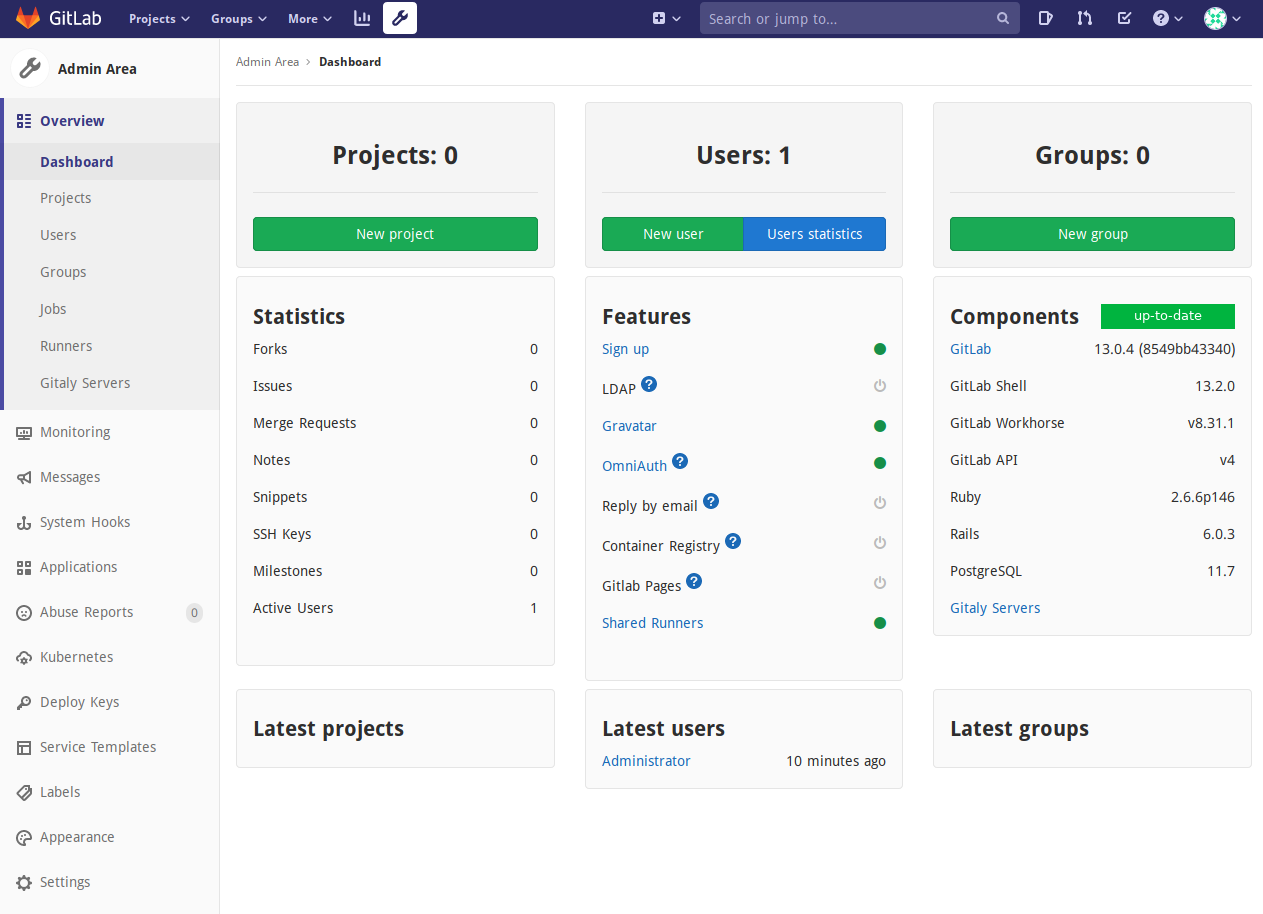First impressions of Fedora CoreOS
Recently released, Fedora CoreOS is the Fedora’s team attempt at building an immutable and container centric operating system.
Let’s take a look
What is Fedora CoreOS
Fedora CoreOS is a fedora derivative centered around three main concepts:
- Container-centric: CoreOS is built in order to make the computer a great candidate for joining in all your Kubernetes and Docker endavours
- Immutability: The system configuration is applied at boot time. In order to reconfigure the machine, the system has to be reprovisioned. The main benefit of this approach is trying to avoid the configuration management drift that occours over time, encouraging a more structured approach to configuring systems (many refer to that with the term infrastructure as code)
- Transactional updates: Updates are either applied in their entirety or not applied at all, the system preserves past snapshots allowing it to revert to safe savepoints if anything goes south.
It was born from the ideas of CoreOS’s Container Linux and revolves around Fedora packages delivered via a transactional package manager called rpm-ostree and a boot time configuration tool called ignition.
Testbed environment
For this first test I rented one of these cheap KVM virtual private servers.
Sadly the provider did not provide me with a preconfigured image, so I rebooted in the provider’s rescue console running Debian 10.
The first ingredient of our recipe is the coreos-installer, a single binary allowing easy installation.
I could not find a prebuilt binary package, but thanks to coreos-installer being a Rust binary, all it took to compile it from source were these four commands:
# Libraries needed by the OpenSSL crate
apt-get install -y pkg-config libssl-dev
# Rust compiler and tools
wget -O - https://sh.rustup.rs | sh # Please be aware that piping directly into sh is unsafe
# Setup build environment
source $HOME/.cargo/env
# The build command itself
cargo install coreos-installer
The Fedora CoreOS configuration file
The entirety of the system configuration is defined inside a single .yaml file. This file is read and applied only when the machine is reprovisioned so the only way to force a reconfiguration is effectively starting again from a blank slate.
To experiment I started with a very simple one, but there are a lot of things to fiddle with:
variant: fcos
version: 1.0.0
passwd:
users:
- name: "g4b1bb097"
ssh_authorized_keys:
- "<YOUR_PUBLIC_KEY>"
groups: [ 'wheel' ]
storage:
files:
- path: /etc/sudoers.d/passwordless
contents:
inline: |
%wheel ALL=(ALL) NOPASSWD: ALL
mode: 0440
Ignoring the first two lines of boilerplate, this basic config does two things:
- Creates a
g4b1bb097user belonging towheel(the default systemd administrative group) - Creates a file in
/etc/sudoers.d/passwordlessallowing users inwheelto escalate privileges without a password (sinceg4b1bb097is only accessibile via public key authentication)
This very readable file has to be converted into an ignition file (a JSON that can be parsed by the actual installer) so I performed the translation using the handy Fedora CoreOS Configuration Transpiler (FCCT) container:
podman run --rm -i quay.io/coreos/fcct:release --pretty --strict < fcct.yaml > fcct.ign
In order to not have bad surprises I validated the ignition file with the ignition-validate tool’s container image
podman run --rm -i quay.io/coreos/ignition-validate - < fcct.ign
After performing this step, I copied the fcct.ign file to the target and started the installation process:
coreos-installer install --stream testing --ignition-file fcct.ign /dev/sda
Please be aware that here I’m explicitly requesting the testing version, if you want to try the stable you have to remove --stream testing from the command above.
The installation finished in a very short time, thanks also to the very small download size (approximately half a gigabyte)
root@debian:~# coreos-installer install --stream testing --ignition-file fcct.ign /dev/sda
Downloading testing image (raw.xz) and signature
gpg: Signature made Wed 03 Jun 2020 04:28:09 AM UTC
gpg: using RSA key 6C13026D12C944D0
gpg: Good signature from "Fedora (32) <fedora-32-primary@fedoraproject.org>" [ultimate]
> Read disk 479.5 MiB/479.5 MiB (100%)
Writing Ignition config
Install complete.
By peeking at the installation disk partition layout we can see that currently the installed system is not taking up the entire disk:
root@debian:~# lsblk
NAME MAJ:MIN RM SIZE RO TYPE MOUNTPOINT
sda 8:0 0 200G 0 disk
├─sda1 8:1 0 384M 0 part
├─sda2 8:2 0 127M 0 part
├─sda3 8:3 0 1M 0 part
└─sda4 8:4 0 2.2G 0 part
First boot
It is now time to kickoff a reboot with systemctl reboot and see what happens through the VNC console.
The boot menu is mostly unpopulated, with only the latest release, after upgrading there will be extra entries, allowing for easy rollback

Here the ignition tool is expanding and repartitioning the disk

If you have specified other options such as our passwordless file, ignition will apply these modifications too

After ~10 seconds the system is ready to roll, indicating its SSH fingerprints and IP address

Inspection of the booted system
The system has been automatically repartitioned as follows
[g4b1bb097@localhost ~]$ lsblk
NAME MAJ:MIN RM SIZE RO TYPE MOUNTPOINT
sda 8:0 0 200G 0 disk
├─sda1 8:1 0 384M 0 part /boot
├─sda2 8:2 0 127M 0 part /boot/efi
├─sda3 8:3 0 1M 0 part
└─sda4 8:4 0 199.5G 0 part /sysroot
[g4b1bb097@localhost ~]$ mount
/dev/sda1 on /boot type ext4 (rw,relatime,seclabel)
/dev/sda2 on /boot/efi type vfat (rw,relatime,fmask=0022,dmask=0022,codepage=437,iocharset=ascii,shortname=mixed,errors=remount-ro)
/dev/sda4 on /var type xfs (rw,relatime,seclabel,attr2,inode64,logbufs=8,logbsize=32k,prjquota)
Fedora CoreOS on its own is very light on resources, thanks to a minimal amount of enabled services
[g4b1bb097@localhost ~]$ free -h
total used free shared buff/cache available
Mem: 7.8Gi 157Mi 7.4Gi 0.0Ki 206Mi 7.4Gi
Swap: 0B 0B 0B
[g4b1bb097@localhost ~]$ systemctl list-unit-files --state=enabled
UNIT FILE STATE VENDOR PRESET
ostree-finalize-staged.path enabled enabled
afterburn-checkin.service enabled enabled
afterburn-firstboot-checkin.service enabled enabled
afterburn-sshkeys@.service enabled enabled
autovt@.service enabled disabled
chronyd.service enabled enabled
console-login-helper-messages-issuegen.service enabled enabled
console-login-helper-messages-motdgen.service enabled enabled
coreos-check-ignition-config.service enabled enabled
coreos-check-ssh-keys.service enabled enabled
coreos-liveiso-success.service enabled enabled
coreos-update-ca-trust.service enabled enabled
dbus-broker.service enabled enabled
dbus-org.freedesktop.nm-dispatcher.service enabled disabled
dbus.service enabled disabled
dbxtool.service enabled enabled
fedora-coreos-pinger.service enabled enabled
getty@.service enabled enabled
ignition-firstboot-complete.service enabled enabled
irqbalance.service enabled enabled
lvm2-monitor.service enabled enabled
mdmonitor.service enabled enabled
multipathd.service enabled enabled
NetworkManager-dispatcher.service enabled enabled
NetworkManager-wait-online.service enabled enabled
NetworkManager.service enabled enabled
ostree-remount.service enabled enabled
selinux-autorelabel-mark.service enabled enabled
sshd.service enabled enabled
sssd.service enabled enabled
systemd-pstore.service enabled enabled
zincati.service enabled enabled
dbus.socket enabled enabled
dm-event.socket enabled enabled
docker.socket enabled enabled
lvm2-lvmpolld.socket enabled enabled
multipathd.socket enabled disabled
ctrl-alt-del.target enabled disabled
machines.target enabled enabled
reboot.target enabled enabled
remote-cryptsetup.target enabled enabled
remote-fs.target enabled enabled
runlevel6.target enabled disabled
fstrim.timer enabled enabled
logrotate.timer enabled enabled
45 unit files listed.
Trying out a test container
I decided to test out Fedora CoreOS with a realistic container: a GitLab 13 instance
podman run --rm \
-e GITLAB_OMNIBUS_CONFIG="gitlab_rails['initial_root_password'] = \"myVeeerySecurePassword\";" \
-p 2222:22 \
-p 80:80 \
-p 443:443 \
--name gitlab \
gitlab/gitlab-ce:13.0.4-ce.0
After a while, via a browser

As expected, everything went smoothly!
Conclusion
I like very much this paradigm and I am looking forward to exaustively trying out the system with a variety of workloads.
Of course this blogpost was only about the very first step, so I’ll see you later for more experimentation with Fedora CoreOS.
Happy hacking!